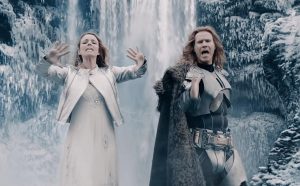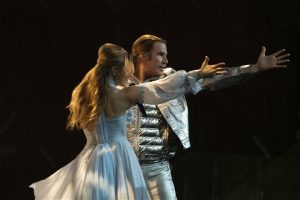Confession time: I’m a sucker for dumb wholesome movies with musical numbers, and Eurovision Song Contest: The Story Of Fire Saga fits the bill perfectly. Is it by any stretch of the imagination a good movie, technically? Nope. Is it, on the other hand, a really stupid comedy filled with outlandish humor, ridiculous scenarios and catchy songs? Yes, and it’s so unapologetically the latter that I can’t in all honesty fault it for not being the former. Sometimes, you have to just accept something bad and love it despite that fact – and there you go, I’ve summed up the entire plot of Eurovision Song Contest for you.

Now, here’s another confession for you: I am American, but I actually knew what Eurovision was long before watching this movie, and it surprises me that so many are only just now being introduced to the zany glory that is the real-life Eurovision Song Contest. Started after World War II with the intention of uniting the European countries through song and dance, the contest is still going strong to this day (well, actually, not this year, thanks to coronavirus), and now even hosts countries that technically aren’t part of Europe, (looking at you, Australia), all of which come together to try and outdo each other with a series of successively weirder and weirder performances. Some people will poke fun at the contest: it’s an acquired taste, and I understand that. I just think some people don’t admire or respect the contest’s noble purpose. But yeah, anyway, I love Eurovision. I also love a number of obscure musical artists from all over Europe, some of whom have performed at Eurovision, some of whom, unfortunately, haven’t gotten the chance – yet. This film, thankfully, manages to temporarily satisfy my unceasing desire for more weird European music: though let me be clear, it barely does so.
My biggest complaint with the film has to be that there’s simply not enough musical numbers- especially not ones which exemplify the absolute insanity of Eurovision. There’s “Volcano Man”, the upbeat song about a dormant volcanic spirit looking for love which puts the Icelandic duo known as Fire Saga on the map and sets the tone for the rest of the movie; “Double Trouble”, which is fun, but is also undeniably helped out by the fact that Will Ferrell is rolling around in a giant hamster-wheel during one performance of the song; a mostly uninteresting highlight reel of the other contestants, including Demi Lovato’s “Mirror”; and my two personal favorites – the Song-Along sequence, which involves about a dozen performers passing different songs around the room and each singing a verse, which might sound awkward but is actually extremely fun to watch; and of course the big surprise song in the finale where the film’s real star Rachel McAdams gets to truly shine, with a big assist from Swedish pop-star Molly Sandén’s vocals (Sandén, by the way, has an excellent career apart from this film, and I’m a big fan of her: that information is, strictly speaking, unnecessary, but I just thought you should know).

When I say that Rachel McAdams is the real star of the movie, I absolutely mean it. McAdams’ character, mild-mannered pagan Sigrit Ericksdottir, carries the film through some of its worst rough patches in the bloated second act, and her desperate attempts to try and appease the Elves of ancient Icelandic folklore are, dare I say it, very relatable (this movie is exposing a lot about me). And while she’s not actually the one singing, she still brings all the onstage charisma and dramatic flair one would expect from a real Eurovision performer.
Will Ferrell, on the other hand, is doing his best: but he’s not particularly funny here. He also doesn’t ever really shine when he’s onstage alongside McAdams, as his singing voice isn’t particularly impressive. He has most of the big emotional beats in the story, which all fall a little flat due to being extremely predictable. His character, Lars Erickssong, is at his best when he’s dressed like a heavy metal Viking and dancing in the frigid wilderness: the more conventional parts of his story arc – trying to win respect from his father, who for some reason is Pierce Brosnan; pushing away Sigrit’s romantic advances because he’s focused on winning; making promises to himself to never be laughed at again, and so on – all seem out of place in a movie that should be over the top at all times.
The other performances in the film have good and bad elements: perhaps the most notable is a glorified cameo from TV personality Graham Norton, who provides cruel and merciless narration of Fire Saga’s various onstage disasters. The lineup of other singers includes Alexander Lemtov (Dan Stevens), a flamboyantly dressed Eastern European with murky motivations, who does at least get to deliver one of the best lines in the entire movie – though it’s in his very last scene, so you’ll have to wait awhile; Demi Lovato as Katiana, another Icelander, who has a very small role in the beginning of the movie and then keeps showing up for reasons that are never explained; and a long list of past Eurovision winners and contestants who show up for brief cameos, including Israel’s Netta, Austrian drag queen Conchita Wurst, French YouTuber Bilal Hassani, and John Lundvik of Sweden. Mikael Persbrandt, who appeared as the shape-shifter Beorn in The Hobbit, has a small but pivotal role as a member of the Icelandic government whose key-chain doubles as a garrote – because why not?

Unfortunately, all of this talent would probably have been better utilized in a slightly better film – Eurovision Song Contest, is, I must admit, far too long for a movie of so little plot. If every minute of available screen time had been packed full of music, I might have understood why it needed to be just over two hours long: but we spend a lot of time focusing on Lars’ boring emotional baggage, Sigrit being unsuccessfully wooed by Lemtov, Lars being unsuccessfully seduced by a Greek singer, and, worst of all, wandering around Eurovision host city Edinburgh without a single sight of the River Leith – and yes, that’s obviously a legitimate criticism of this film.
But what can I say? I enjoyed most of the time I spent watching Eurovision Song Contest, and I don’t regret it. That being said, you have to remember I have a clear bias: I just really like Eurovision, so this was always going to be my cup of tea. I’m a little unhappy that this movie might not be good enough to inspire viewers to check out the real thing, but at least Iceland now has a movie that honors their rich, vibrant, underappreciated musical culture.
Movie Rating: 5.9/10